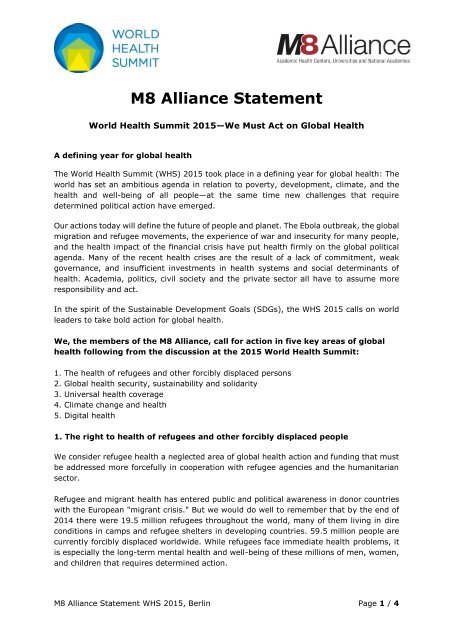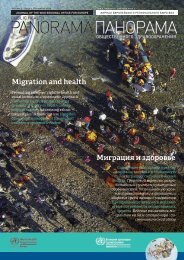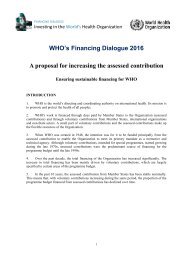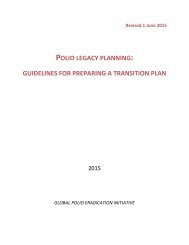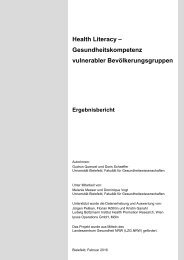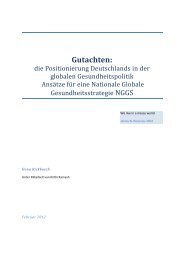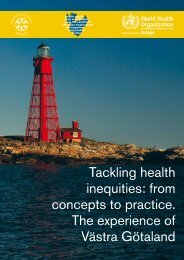M8 Alliance Statement
TmBLO
TmBLO
Create successful ePaper yourself
Turn your PDF publications into a flip-book with our unique Google optimized e-Paper software.
<strong>M8</strong> <strong>Alliance</strong> <strong>Statement</strong><br />
World Health Summit 2015—We Must Act on Global Health<br />
A defining year for global health<br />
The World Health Summit (WHS) 2015 took place in a defining year for global health: The<br />
world has set an ambitious agenda in relation to poverty, development, climate, and the<br />
health and well-being of all people—at the same time new challenges that require<br />
determined political action have emerged.<br />
Our actions today will define the future of people and planet. The Ebola outbreak, the global<br />
migration and refugee movements, the experience of war and insecurity for many people,<br />
and the health impact of the financial crisis have put health firmly on the global political<br />
agenda. Many of the recent health crises are the result of a lack of commitment, weak<br />
governance, and insufficient investments in health systems and social determinants of<br />
health. Academia, politics, civil society and the private sector all have to assume more<br />
responsibility and act.<br />
In the spirit of the Sustainable Development Goals (SDGs), the WHS 2015 calls on world<br />
leaders to take bold action for global health.<br />
We, the members of the <strong>M8</strong> <strong>Alliance</strong>, call for action in five key areas of global<br />
health following from the discussion at the 2015 World Health Summit:<br />
1. The health of refugees and other forcibly displaced persons<br />
2. Global health security, sustainability and solidarity<br />
3. Universal health coverage<br />
4. Climate change and health<br />
5. Digital health<br />
1. The right to health of refugees and other forcibly displaced people<br />
We consider refugee health a neglected area of global health action and funding that must<br />
be addressed more forcefully in cooperation with refugee agencies and the humanitarian<br />
sector.<br />
Refugee and migrant health has entered public and political awareness in donor countries<br />
with the European "migrant crisis." But we would do well to remember that by the end of<br />
2014 there were 19.5 million refugees throughout the world, many of them living in dire<br />
conditions in camps and refugee shelters in developing countries. 59.5 million people are<br />
currently forcibly displaced worldwide. While refugees face immediate health problems, it<br />
is especially the long-term mental health and well-being of these millions of men, women,<br />
and children that requires determined action.<br />
<strong>M8</strong> <strong>Alliance</strong> <strong>Statement</strong> WHS 2015, Berlin Page 1 / 4
Call for action: The <strong>M8</strong> <strong>Alliance</strong> appeals to all parties involved that refugees should have<br />
access to health services equivalent to that of the host population. Everyone has the right<br />
under international law to the highest standards of physical and mental health. Refugee<br />
policies must prioritize the most important determinant of long-term well-being: the<br />
integration of refugees into the new country's health and social system.<br />
2. The right of all people to health security, sustainability and solidarity<br />
We are deeply concerned by the ongoing challenges the world faces in the area of global<br />
health security and we underline the need to better ensure global disease outbreak<br />
preparedness and response, cooperation in humanitarian crisis, and security for health<br />
institutions and staff in conflict zones.<br />
In the context of the increased cross-border movement of people, products, and infectious<br />
microbes, countries must join forces to make the world a safer place and to ensure the<br />
health security of the poorest and of migrants and refugees. It is an unacceptable affront<br />
to the Geneva Conventions that hospitals in conflict zones can no longer be considered<br />
protected spaces. During this year, the G7 under the German presidency gave strong<br />
political support to the global health agenda—in particular the need to address neglected<br />
tropical diseases (NTDs) and antimicrobial resistance (AMR) as well as to ensure that the<br />
world is better prepared for outbreaks in the wake of the Ebola crisis.<br />
Call for action: The <strong>M8</strong> <strong>Alliance</strong> calls on all countries and development partners to invest<br />
with determination in education, research, infrastructure, and specifically diagnostics and<br />
treatment of neglected tropical diseases and—following the Ebola crisis—to ensure the full<br />
implementation of the International Health Regulations by investing in country-based<br />
preparedness and response and the establishment of a reliable global response system.<br />
We further call for determined action on implementing the One Health approach to fight<br />
antimicrobial resistance AMR.<br />
3. The right of all people to universal health coverage<br />
We emphasize that investment in health is key to sustainable development and fully<br />
commit to support goal 3, which aims to: "Ensure healthy lives and promote well-being for<br />
all at all ages." We agree with Director General Margaret Chan of the WHO that "Universal<br />
health coverage (UHC) is the single most powerful concept that public health has to offer."<br />
Just two weeks before, the Sustainable Development Goals were adopted at the United<br />
Nations General Assembly and set a new vision for cooperation between nations. The<br />
world's leading economists have argued that expanding investments in health will be key<br />
to achieving sustainable development. The WHS discussed many of the issues integral to<br />
this goal including the rise of non-communicable diseases and the need for a high-quality<br />
workforce.<br />
Call for action: The <strong>M8</strong> <strong>Alliance</strong> calls on all development partners and countries to<br />
significantly accelerate their investment in UHC, including the access to medicines and the<br />
development of the global health workforce. The commitment to work jointly between<br />
<strong>M8</strong> <strong>Alliance</strong> <strong>Statement</strong> WHS 2015, Berlin Page 2 / 4
public and private partners and with full inclusion of communities and patients toward<br />
achieving high-quality universal health coverage is a priority.<br />
4. The right of all people to a healthy planet<br />
We emphasize that the health of the planet and of people are inextricably linked and that<br />
it is critical to apply a human-rights-based approach to guide global policies and measures<br />
designed to address climate change. Tackling climate change could be the greatest global<br />
health opportunity of the 21st century.<br />
In December 2015, countries will negotiate a new COP21 global climate agreement. We<br />
are concerned that the negative impacts of climate change are disproportionately borne by<br />
persons and communities already in disadvantageous situations that have historically<br />
contributed the least to greenhouse gas emissions. We reinforce that safeguarding health<br />
cannot be addressed separately from the natural systems on which it depends; strong<br />
intersectoral action is required.<br />
Call for action: The <strong>M8</strong> <strong>Alliance</strong> urges a strong climate agreement and bold collective<br />
action at a global, national, and local level on the health impact of climate change. The<br />
WHS calls on all countries and development partners—global, national, and local—to<br />
address climate change and sustainable production and consumption. In particular, it calls<br />
on health organizations to take on a leadership role in the movement toward a low-carbon<br />
economy and healthy climate.<br />
5. The digital health rights of citizens<br />
We call for an intensified dialogue on the potential of digital health—ranging from wearable<br />
sensors and portable diagnostic technologies to telemedicine tools and mobile health care<br />
apps—for individuals and society. Concerns grow about the privacy and security of peoples'<br />
data. We believe that clear policies and standards can help build public trust as the use of<br />
big data, electronic health records, the electronic sharing of health information, and health<br />
information technology increase.<br />
A new world of heath care is emerging—there are significant opportunities for the<br />
introduction of new technologies into clinical practice so as to enhance quality of care as<br />
well as personalize and measure outcomes and expanding points of care. Such<br />
technologies, including health apps and data sharing, can empower consumers and let<br />
them participate more in prevention and care, but this requires an investment in high levels<br />
of health literacy of patients and users.<br />
Call for action: The <strong>M8</strong> <strong>Alliance</strong> calls for an approach to digital health that works toward<br />
achieving the vision of the triple aim: improving population health, improving care<br />
experiences, and reducing per-capita costs of care. As digital health becomes a powerful<br />
driver in health, it is important that policy makers and legislators ensure the safety of the<br />
devices, the rights of consumers to the privacy of their data, and the equal access of<br />
patients to such innovation.<br />
<strong>M8</strong> <strong>Alliance</strong> <strong>Statement</strong> WHS 2015, Berlin Page 3 / 4
General Information<br />
The World Health Summit<br />
The World Health Summit (WHS) is one of the world's most prominent forums for issues<br />
involving health care. The interdisciplinary, international event takes place in an<br />
atmosphere of academic freedom.<br />
Every October, internationally renowned leaders and representatives from the sciences,<br />
politics, business, and civil society travel to Berlin for the WHS to discuss the latest<br />
challenges facing medical research and health care. Under the high patronage of German<br />
Chancellor Angela Merkel, French President François Hollande and European Commission<br />
President Jean-Claude Juncker, the Summit is the premiere international platform for<br />
exploring strategic developments and decisions in the area of health care.<br />
The World Health Summit's academic think tank is provided by the <strong>M8</strong> <strong>Alliance</strong>, a unique<br />
collaborative network made up of leading international medical universities, research<br />
institutions, and the Interacademy Medical Panel (IAMP)—representing National<br />
Academies from 67 countries. The World Health Summit also organizes the Regional<br />
Meeting that takes place each April in the country of the acting President.<br />
The <strong>M8</strong> <strong>Alliance</strong><br />
The <strong>M8</strong> <strong>Alliance</strong> of Academic Health Centers, Universities and National Academies is a<br />
collaborative network of academic institutions known for its educational and research<br />
excellence. The network was founded in 2009 at the inaugural World Health Summit, and<br />
has provided an outstanding academic foundation to every WHS event since.<br />
The <strong>M8</strong> <strong>Alliance</strong> currently has 21 members based in 16 different countries, all of which<br />
are committed to improving global health and working with political and economic<br />
decision-makers to develop science-based solutions to health challenges worldwide.<br />
The <strong>M8</strong> <strong>Alliance</strong> promotes the bench to bedside to population health translation of<br />
research, as well as the transformation of current medical care approaches to treating<br />
the ill by creating health care systems aimed at the effective prevention of disease. The<br />
organization also works to adapt health-related solutions to rapidly changing living<br />
conditions through research in priority areas, especially shifting demographics,<br />
urbanization, and climate change.<br />
<strong>M8</strong> <strong>Alliance</strong> <strong>Statement</strong> WHS 2015, Berlin Page 4 / 4


